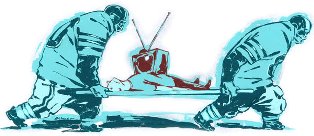February 6th, 2011 by Dinah Miller, M.D. in Health Tips, Humor
No Comments »


 So it’s Super Bowl Sunday and the fans are psychiatric patients waiting to happen — the beer and the beer and the beer, and maybe the fights will break out, and they’ll all end up in therapy. Oh, the angst and the panic, and the pre-game anxiety, and the post-game euphoria or depression.
So it’s Super Bowl Sunday and the fans are psychiatric patients waiting to happen — the beer and the beer and the beer, and maybe the fights will break out, and they’ll all end up in therapy. Oh, the angst and the panic, and the pre-game anxiety, and the post-game euphoria or depression.
New York Times reporter Benedict Carey talks about treatment options in his article, “A Home Treatment Kit for Super Bowl Suffering.” Mr. Carey suggests:
Breathing exercises are highly recommended and become increasingly important as the football contest nears the fourth quarter, when events on the field are likely to prompt strong physiological reactions, like a pounding heart, hyperventilation, even dizziness. These internal cues, as they’re called, can escalate the feeling of panic, a self-reinforcing cycle resulting in groans and cries that can be frightening to small children, pets and sometimes neighbors.
In the final minutes of the game, be forewarned: Many patients will move beyond the reach of therapy. Their faces may change, their breathing appear to stop. Researchers have not determined whether this state is closer to Buddhist meditation or to the experience of freefall from an airplane. All that is known is that, once in it, patients will fall back on primal coping methods, behaviors learned in childhood within the cultural context of their family.
Like emitting screams. Or leaping in an animated way, as if the floor were on fire. Or falling on their back and moving their arms and legs like an overturned beetle, in celebratory fashion.
This post is dedicated to my husband and son.
*This blog post was originally published at Shrink Rap*
January 29th, 2011 by Peggy Polaneczky, M.D. in Opinion, Research
3 Comments »

Here’s yet another study showing that abortion does NOT lead to future psychiatric problems. From The New York Times:
The New England Journal of Medicine has taken on one of the pillar arguments in the abortion debate, asking whether having the procedure increases a woman’s risk of mental-health problems and concluding that it doesn’t. In fact, researchers found, having a baby brings a far higher risk.
The study, by Danish scientists (and financed in part by the Susan Thompson Buffett Foundation, which supports research on abortion rights), is the most extensive of its kind to date. It studied 365,550 Danish women who had an abortion or gave birth for the first time between 1995 and 2007. Of those, 84,620 terminated their pregnancies and 280,930 gave birth.
In the year after an abortion, 15.2 out of 1,000 sought psychiatric help (defined as admission to a hospital or clinic), which was essentially the same as the rate of that group (14.6 per 1,000) in the nine months before the abortion. In contrast, among women who went on to give birth, the rate at which they sought treatment increased to 6.7 per 1,000 after delivery from 3.9 per 1,000 before.
Why do first-time mothers have a lower overall rate of mental illness both before and after pregnancy than those who choose termination? The researchers suggest that those who have abortions are more likely to have emotional problems in the first place. Compared with the group who give birth, those who have abortions are also statistically more likely to be struggling economically, and to have a higher rate of unintended pregnancies.
And why do first-time mothers seem to nearly double their risk in the year after giving birth? That is likely to have something to do with the hormonal changes, decreased sleep, and increased stress of parenting, which women who terminate do not experience.
Can we please talk about something else? Like maybe how to help these young women with the issues and unmet contraceptive needs that led to unplanned pregnancy in the first place?
*This blog post was originally published at The Blog That Ate Manhattan*

 So it’s Super Bowl Sunday and the fans are psychiatric patients waiting to happen — the beer and the beer and the beer, and maybe the fights will break out, and they’ll all end up in therapy. Oh, the angst and the panic, and the pre-game anxiety, and the post-game euphoria or depression.
So it’s Super Bowl Sunday and the fans are psychiatric patients waiting to happen — the beer and the beer and the beer, and maybe the fights will break out, and they’ll all end up in therapy. Oh, the angst and the panic, and the pre-game anxiety, and the post-game euphoria or depression.











